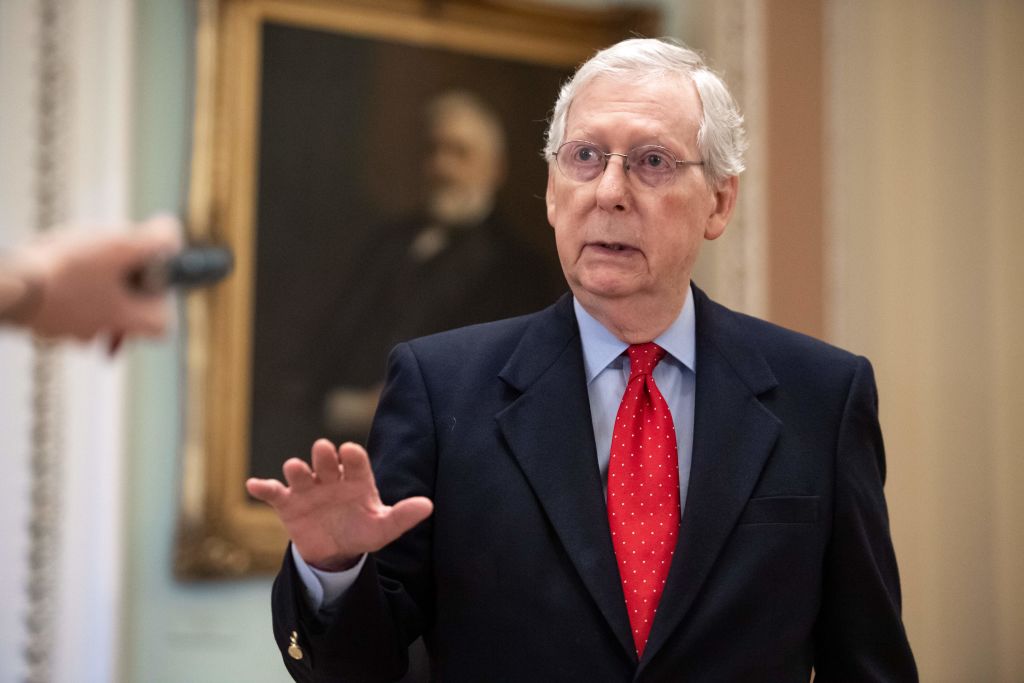Trump, McConnell insist no state, local government funds in imminent coronavirus rescue package


A free daily email with the biggest news stories of the day – and the best features from TheWeek.com
You are now subscribed
Your newsletter sign-up was successful
Congressional and White House negotiators were working late Sunday night to finalize a fourth coronavirus rescue package, with a goal of getting it approved by Congress on Wednesday. The package, currently worth about $470 billion, is focused on adding $310 billion to the tapped-out Paycheck Protection Program, bank-issued government loans aimed at keeping small businesses afloat and staffed. Democrats also won $75 billion for hospitals and $25 billion for testing, and there is another $60 billion for another drained emergency lending program for small businesses.
The bailout package will not include $150 billion for state and local governments, another Democratic priority, Treasury Secretary Steven Mnuchin and Senate Majority Leader Mitch McConnell (R-Ky.) told Senate Republicans on Sunday afternoon, Senate GOP aides told Politico and Axios. McConnell noted the deal has not yet been finalized.
"The thinking among some Trump administration officials is that many states should be reopening their governments soon and that additional funding could deter them from doing so," reports Axios' Alayna Treene. Politico adds: "The White House and Trump administration have been holding out because, in part, they believe if Congress keeps cutting checks for state and local governments, they will be disincentivized to open up their economies."
The Week
Escape your echo chamber. Get the facts behind the news, plus analysis from multiple perspectives.

Sign up for The Week's Free Newsletters
From our morning news briefing to a weekly Good News Newsletter, get the best of The Week delivered directly to your inbox.
From our morning news briefing to a weekly Good News Newsletter, get the best of The Week delivered directly to your inbox.
States and cities have taken steep hits to their budgets from the coronavirus outbreak. "It's important for the feds to support our efforts to fund the stuff we do," Massachusetts Gov. Charlie Baker (R-Mass.) said on CBS News. "If we're laying off tens of thousands of people at exactly the time when they want to reopen the economy, we're going to be swimming against the current they're trying to create." Trump said Sunday evening he supports backstopping states and local governments at "another time." White House officials tell Axios they envision such a package weeks or months from now.
The White House reiterated Sunday on Twitter that, as far as they see it, "the success of the phased approach will rely on preparedness and planning by states — safe and efficient screening, sufficient PPE supplies, and the ability to mitigate any rebound."
A free daily email with the biggest news stories of the day – and the best features from TheWeek.com
Peter has worked as a news and culture writer and editor at The Week since the site's launch in 2008. He covers politics, world affairs, religion and cultural currents. His journalism career began as a copy editor at a financial newswire and has included editorial positions at The New York Times Magazine, Facts on File, and Oregon State University.
-
 How Democrats are turning DOJ lemons into partisan lemonade
How Democrats are turning DOJ lemons into partisan lemonadeTODAY’S BIG QUESTION As the Trump administration continues to try — and fail — at indicting its political enemies, Democratic lawmakers have begun seizing the moment for themselves
-
 ICE’s new targets post-Minnesota retreat
ICE’s new targets post-Minnesota retreatIn the Spotlight Several cities are reportedly on ICE’s list for immigration crackdowns
-
 ‘Those rights don’t exist to protect criminals’
‘Those rights don’t exist to protect criminals’Instant Opinion Opinion, comment and editorials of the day
-
 TikTok secures deal to remain in US
TikTok secures deal to remain in USSpeed Read ByteDance will form a US version of the popular video-sharing platform
-
 Unemployment rate ticks up amid fall job losses
Unemployment rate ticks up amid fall job lossesSpeed Read Data released by the Commerce Department indicates ‘one of the weakest American labor markets in years’
-
 US mints final penny after 232-year run
US mints final penny after 232-year runSpeed Read Production of the one-cent coin has ended
-
 Warner Bros. explores sale amid Paramount bids
Warner Bros. explores sale amid Paramount bidsSpeed Read The media giant, home to HBO and DC Studios, has received interest from multiple buying parties
-
 Gold tops $4K per ounce, signaling financial unease
Gold tops $4K per ounce, signaling financial uneaseSpeed Read Investors are worried about President Donald Trump’s trade war
-
 Electronic Arts to go private in record $55B deal
Electronic Arts to go private in record $55B dealspeed read The video game giant is behind ‘The Sims’ and ‘Madden NFL’
-
 New York court tosses Trump's $500M fraud fine
New York court tosses Trump's $500M fraud fineSpeed Read A divided appeals court threw out a hefty penalty against President Trump for fraudulently inflating his wealth
-
 Trump said to seek government stake in Intel
Trump said to seek government stake in IntelSpeed Read The president and Intel CEO Lip-Bu Tan reportedly discussed the proposal at a recent meeting
